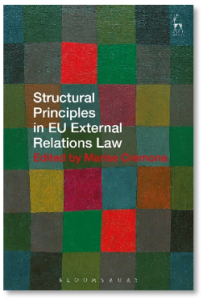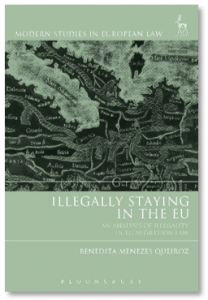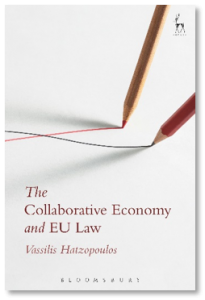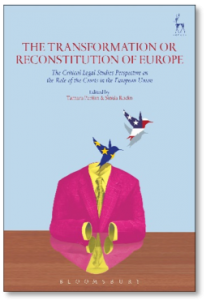The editors of the KSLR EU Law Blog are pleased to announce some recent publications in the field of EU law with special discounts for the readers of our blog.
Structural Principles in EU External Relations Law
Edited by Marise Cremona
The law and practice of EU external relations is governed not only by general objectives (Articles 3(5) and 21 TEU and Article 205 TFEU) and values (Article 2 TEU) but also by a set of principles found in the Treaties and developed by the Court of Justice, which structure the system, functioning and exercise of EU external competences. This book identifies a set of ‘structural principles’ as a legal norm-category governing EU external relations; it explores the scope, content and function of those principles that may be categorised as structural. With an ambitious scope, and a stellar line-up of experts in the field, the collection offers a truly innovative perspective on the role of law in EU external relations.
Marise Cremona is Emeritus Professor at the European University Institute, Florence.
February 2018 | 9781782259978 | 336pp | Hardback | RSP: £70
Discount Price: £56
Order online at www.hartpublishing.co.uk – use discount code CV7 at the checkout to get 20% off!
Illegally Staying in the EU
An Analysis of Illegality in EU Migration Law
Benedita Menezes Queiroz
Principally, this book comprises a conceptual analysis of the illegality of a third-country national’s stay by examining the boundaries of the overarching concept of illegality at the EU level. Having found that the holistic conceptualisation of illegality, constructed through a combination of sources (both EU and national law) falls short of adequacy, the book moves on to consider situations that fall outside the traditional binary of legal and illegal under EU law. The cases of unlawfully staying EU citizens and of non-removable illegally staying third-country nationals are examples of groups of migrants who are categorised as atypical. By looking at these two examples the book reveals not only the fragmentation of legal statuses in EU migration law but also the more general ill-fitting and unsatisfactory categorisation of migrants.
The potential conflation of illegality with criminality as a result of the way EU databases regulate the legal regime of illegality of a migrant’s stay is the first trend identified by the book. Subsequently, the book considers the functions of accessing legality (both instrumental and corrective). In doing so it draws out another trend evident in the EU illegality regime: a two-tier regime which discriminates on the basis of wealth and the instrumentalisation of access to legality by Member States for mostly their own purposes.
Finally, the book proposes a corrective rationale for the regulation of illegality through access to legality and provides a number of normative suggestions as a way of remedying current deficiencies that arise out of the present supranational framing of illegality.
Benedita Menezes Queiroz is a Teaching Assistant at the School of Transnational Governance of the European University Institute, Florence and Senior Research Fellow at CIDP – Lisbon Centre for Research in Public Law.
February 2018 | 9781509912872 | 232pp | Hardback | RSP: £65
Discount Price: £52
Order online at www.hartpublishing.co.uk – use discount code CV7 at the checkout to get 20% off!
The Collaborative Economy and EU Law
Vassilis Hatzopoulos
‘Disruptive innovation’, ‘the fourth industrial revolution’, ‘one of the ten ideas that will change the world’; the collaborative/sharing economy is shaking existing norms. It poses unprecedented challenges in terms of both material policies and governance in almost all aspects of EU law.
This book explores the application – or indeed inadequacy – of existing EU rules in the context of the collaborative economy. It analyses the novelties introduced by the collaborative economy and discusses the specific regulatory needs and instruments employed therein, most notably self-regulation. Further, it aims to elucidate the legal status of the parties involved (traders, consumers, prosumers) in these multi-sided economies, and their respective roles in the provision of services, especially with regard to liability issues. Moreover, it delves into a sector-specific examination of the relevant EU rules, especially on data protection, competition, consumer protection and labour law, and comments on the uncertainties and lacunae produced therein. It concludes with the acute question of whether fresh EU regulation would be necessary to avoid fragmentation or, on the contrary, if such regulation would create unnecessary burdens and stifle innovation.
Taking a broad perspective and pragmatic view, the book provides a comprehensive overview of the collaborative economy in the context of the EU legal landscape.
Vassilis Hatzopoulos is Professor of EU Law and Policies at the Panteion University of Athens; Provost of the European Law and Governance School, Athens; and Visiting Professor at the College of Europe, Bruges. He is also an Attorney-at-Law of the Athens
February 2018 | 9781509917136 | 320pp | Hardback | RSP: £70
Discount Price: £56
Order online at www.hartpublishing.co.uk – use discount code CV7 at the checkout to get 20% off!
The Transformation or Reconstitution of Europe
The Critical Legal Studies Perspective on the Role of the Courts in the European Union
Edited by Tamara Perišin and Siniša Rodin
It is generally understood that EU law as interpreted by the ECJ has not merely reconstituted the national legal matrix at the supranational level, but has also transformed Europe and shaken the well-established, often formalist, ways of thinking about law in the Member States. This innovative new study seeks to examine such a narrative through the lens of the American critical legal studies (CLS) perspective.
The introduction explains how the editors understand CLS and why its methodology is relevant in the European context. Part II examines whether and how judges embed policy choices or even ideologies in their decisions, and how to detect them. Part III assesses how the ECJ acts to ensure the legitimacy of its decisions, whether it resists implementing political ideologies, what the ideology of European integration is, and how the selection of judges influences these issues. Part IV uses the critical perspective to examine some substantive parts of EU law, rules on internal and external movement, and the European arrest warrant. It seeks to determine whether the role of the ECJ has really been transformative and whether that transformation is reversible. Part V considers the role of academics in shaping the narratives of EU integration.
Tamara Perišin is Professor and Jean Monnet Chair at the University of Zagreb.
Siniša Rodin is Judge at the Court of Justice of the European Union.
February 2018 | 9781509907250 | 256pp | Hardback | RSP: £65
Discount Price: £52
Order online at www.hartpublishing.co.uk – use discount code CV7 at the checkout to get 20% off!



